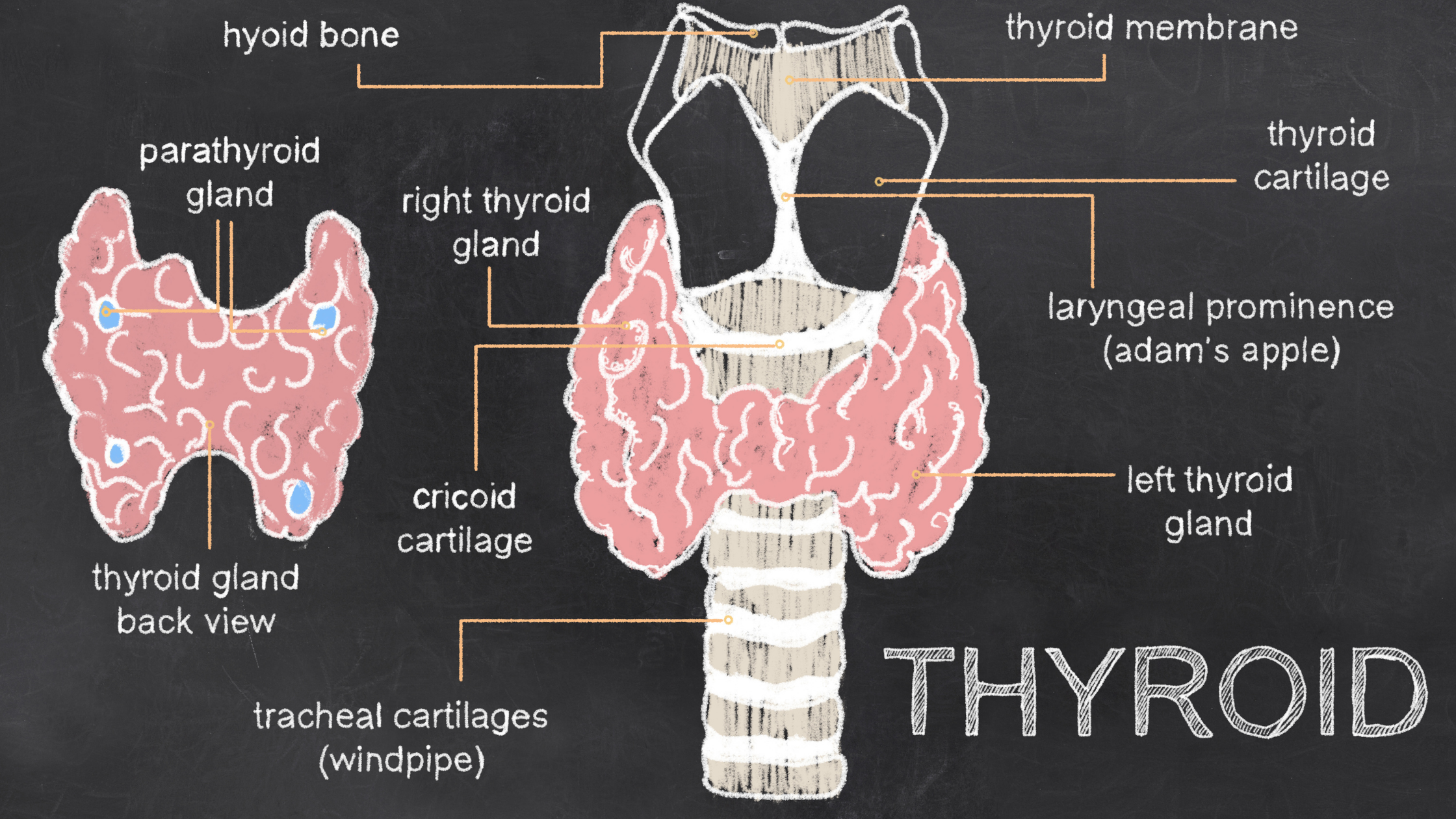Thyroid issues are surprisingly common – but they often go undiagnosed. They can lead to a range of symptoms, from depression and anxiety to fatigue, cholesterol issues, weight gain/loss, and reproductive health issues.
Your thyroid plays an important role in your body, affecting almost every organ from your skin to your brain and stomach. For this reason, it’s important to look out for your thyroid’s health. Fortunately, thyroid problems are treatable.
What is the thyroid?
The thyroid is a small gland located near the front of your neck. Its job is to release hormones that your body needs in order to function.
Thyroid hormones help regulate your metabolism, which is the process of converting calories into energy. Your thyroid plays a central role in providing energy to almost every organ, affecting your heart, digestive system, and more.
Two of the important hormones it releases are T4 (thyroxine) and T3 (triiodothyronine), which help your body produce and regulate the hormones adrenaline and dopamine. Adrenaline is associated with the emotional and physical responses to fear and excitement, while dopamine is associated with pleasure.
In short, your thyroid is incredibly important to your body’s functioning. Unfortunately, though, it can be prone to certain issues that cause it to produce too much or too little of the above-mentioned hormones. Women are more prone to thyroid issues than men.
Hypothyroidism
Hypothyroidism is a condition where your thyroid doesn’t produce enough hormones. Also called an “under-active thyroid,” this condition affects about 4.6 percent of Americans older than 12. The good news is that it can be treated safely and effectively.
Symptoms of hypothyroidism
The symptoms of hypothyroidism vary from person to person. For some, these symptoms are severe, while for others it’s more manageable. The most common symptoms include:
- depression
- fatigue
- weight gain
- puffy, sensitive face
- decreased fertility
- constipation
- feeling cold
- decreased sweating
- slowed heart rate
- elevated blood cholesterol
- dry skin
- thinning hair
- brain fog and difficulties with concentration
- weak, sore, or stiff muscles and joints
- unexplained menstrual changes
Causes of hypothyroidism
Hypothyroidism can be caused by a range of conditions.
- Thyroiditis, which is the inflammation of the thyroid gland.
- Hashimoto’s thyroiditis, a common autoimmune condition where the body’s cells attack the thyroid.
- Postpartum thyroiditis, a condition that occurs in 5% to 9% of people after childbirth. Fortunately, this is usually a temporary condition.
- Iodine deficiency, because the thyroid needs iodine to produce hormones.
- A non-functioning thyroid gland, which is where the thyroid simply doesn’t work from birth. Newborns are typically screened for thyroid function before leaving the hospital.
- Certain medications such as lithium and amiodarone (Pacerone), an antiarrhythmic drug.
Hyperthyroidism
Also called an over-active thyroid, hyperthyroidism is a condition where the thyroid gland produces an excess of hormones. This can lead to a metabolism that is too fast, and it can be potentially dangerous for heart health.
Around 1 in every 100 Americans aged 12 and older have hyperthyroidism. Fortunately, hyperthyroidism can treated through medication, radioactive iodine, or – in some cases – surgery.
Symptoms of hyperthyroidism
Although the symptoms of hyperthyroidism can vary from person to person, the following symptoms are the most common:
- a goiter (enlarged swelling in the neck)
- weight loss
- frequent bowel movements
- increased appetite
- increased anxiety
- restlessness
- inability to concentrate
- irregular heartbeat
- difficulty sleeping
- protruding eyes
- fine, brittle hair and hair loss
- nausea and vomiting
- irregular menstruation
Causes of hyperthyroidism
- Thyroiditis, which is the swelling of the thyroid. While this can cause hypothyroidism, it can also cause the thyroid to release hormones that should be stored. It can be temporary.
- Graves’ disease, an autoimmune condition that causes the thyroid to produce an excess of hormones.
- Nodules on the thyroid.
- Excessive iodine, which is when you have too much iodine (the mineral that is used to make thyroid hormones) in your body and the thyroid makes more hormones than necessary.
Detecting thyroid problems early
Treating thyroid problems starts with a diagnosis. Your first step is to visit a doctor and describe your symptoms. They will usually do a full physical exam and ask about your personal and family medical history.
From there, your doctor will need to run tests. These typically include:
- Blood tests measuring T4, free T4, T3 (all thyroid hormones)
- Blood tests measuring thyroid-stimulating hormone (TSH) levels
- Cholesterol and/or triglyceride test
Your doctor might also order an ultrasound to determine if there are any masses in the thyroid gland. They might also order a CT or MRI scan, which can detect whether a pituitary tumor is causing the condition.
Knew Health can help manage the cost of these diagnostic tests as we offer a wide range of individual blood tests, panels, and specialty kits that you can order at any time. You can learn more about this and other services Knew Health Members have here.
Treating thyroid problems
Fortunately, thyroid problems are treatable. When you’re diagnosed with a thyroid condition, your doctor should discuss your treatment plan with you. They might also suggest some lifestyle changes to help with the symptoms of your condition.
Hypothyroidism is typically treated by levothyroxine (Levoxyl, Synthroid). Your doctor should supervise your dosage, as it may need to change over time. Usually, your thyroid hormones and TSH levels will have to be tested regularly to ensure that the medication is working correctly.
Hyperthyroidism can be treated with radioactive iodine, which causes the thyroid to shrink. After using radioactive iodine, you might develop hypothyroidism, which means you’ll need to take levothyroxine. Alternatively, hyperthyroidism can be treated with anti-thyroid medication like methimazole (Tapazole) and propylithiouracil.
Because some supplements can affect thyroid medication, it’s important not to use any new supplements without your doctor’s approval. Levothyroxine, for example, should be taken on an empty stomach.
Caring for yourself when you have a thyroid condition
Healthy lifestyle choices – such as ensuring you get enough sleep and eat a balanced diet – can help with some of the symptoms of thyroid conditions. For example, depression and anxiety disorders are easier to manage if you’re well-fed and well-rested.
Your doctor might also be able to advise you on the foods and exercises that will be appropriate for your body and lifestyle. Alternatively, talking to a dietician or a physiotherapist could give you some ideas.
Talking with your doctors
If you have – or suspect you have – a thyroid condition, communicating with a medical professional is key. Knew Health Members are encouraged to use our Medical Concierge services, which can help you find the most reasonably priced medical care.
Our Medical Concierge can also provide you with a free initial consultation with a practice that specializes in thyroid issues, Vytal Health. If you’re interested in learning more about Knew Health services, or if you’re a Member who would like to learn how to schedule a free consultation with this practice, contact us at 855-542-0050.
Many people struggle to get a diagnosis for thyroid conditions because the symptoms can be attributed to other causes. If you think you have a thyroid condition, insist on a full thyroid panel. Remember, you’re allowed to ask the doctor to send you your results directly.
If you need a second opinion, remember that Knew Health Members can access free second opinions for new diagnoses. We also offer services like bill negotiation services and telemedicine services. Together with our medical cost sharing model, this makes it easier to get a diagnosis and find effective treatment.
Having a thyroid condition can cause a range of uncomfortable symptoms – but these conditions can be treated and managed effectively.
Resources
- Burch HB. (2019). Drug effects on the thyroid.
nejm.org/doi/pdf/10.1056/NEJMra1901214 - Hashimoto’s disease [Fact sheet]. (2017).
womenshealth.gov/a-z-topics/hashimotos-disease - Hyperthyroidism. (2010).
ncbi.nlm.nih.gov/pubmedhealth/PMH0001396/ - Hyperthyroidism. (2014).
thyroid.org/patients/brochures/Hyper_brochure.pdf - Hypothyroidism (underactive). (n.d.).
thyroid.org/hypothyroidism - Hypothyroidism (underactive thyroid). (2016).
niddk.nih.gov/health-information/endocrine-diseases/hypothyroidism - Mayo Clinic Staff. (2020). Hypothyroidism (underactive thyroid).
mayoclinic.org/diseases-conditions/hypothyroidism/diagnosis-treatment/drc-20350289 - Postpartum thyroiditis. (2019).
thyroid.org/wp-content/uploads/patients/brochures/Postpartum_Thyroiditis_brochure.pdf - Thyroid & weight. (2019).
thyroid.org/wp-content/uploads/patients/brochures/Thyroid_and_Weight.pdf - Thyroid tests. (2017).
niddk.nih.gov/health-information/diagnostic-tests/thyroid - Underactive thyroid (hypothyroidism). (2018).
nhs.uk/conditions/underactive-thyroid-hypothyroidism/complications
Disclaimer: This information is being provided to you for educational and informational purposes only. It is being provided to educate you about how to take care of your body and as a self-help tool for your own use so that you can reach your own health goals. It is not intended to treat or cure any specific illness and is not to replace the guidance provided by your own medical practitioner. This information is to be used at your own risk based on your own judgment. If you suspect you have a medical problem, we urge you to take appropriate action by seeking medical attention.









































